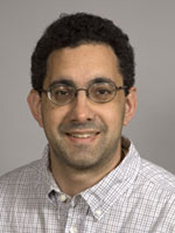 |

For further information, contact the MBL Communications Office at (508) 289-7423 or e-mail us at comm@mbl.edu
For Immediate Release: July 1, 2009
Contact: Gina Hebert, 508-289-7725, ghebert@mbl.edu
 |
 |
Daniel S. Rokhsar
|
|
Genomics of Animal Origins and Diversity To Be Discussed at MBL Friday Evening Lecture, July 10
MBL, WOODS HOLE, MA - Daniel S. Rokhsar, professor at the University of California, Berkeley, and program head for Computational Genomics at the Department of Energy's Joint Genome Institute will discuss the genomics of animal origins and diversity at the MBL Friday Evening Lecture on July 10 at 8:00 PM in the MBL's Lillie Auditorium, located on MBL Street in Woods Hole. The lecture is free and open to the public.
Dr. Rokhsar’s research is focused on understanding the origin, evolution, and diversity of animals and their relatives by combining computational genome analysis with comparative developmental biology.
The first signs of animal life appear in the fossil record nearly 600 million years ago. Modern survivors of these early progenitors include animals such as sponges, anemones, jellyfish, and humans. Each of these modern organisms retains some of the genomic dowry inherited from the earliest animals, elaborated on (and sometimes overwritten by) subsequent evolutionary innovations and losses. By comparing genomes, Dr. Rokhsar and his colleagues not only characterize the basic genetic toolkits of animals, but also map out their evolutionary history, and infer evolutionary mechanisms for the emergence of animal diversity and complexity from more humble unicellular beginnings.
Dr. Rokhsar received his A.B. in Physics from Princeton University and M.S. and Ph.D. degrees in Physics from Cornell University. In the mid 1990s his research interests shifted from materials physics to molecular biology, genomics, and evolution. In 2001 Dr. Rokhsar founded the computational genomics program at the Department of Energy's genome center, and contributed to the sequencing and analysis of the human genome, developing methods applicable to diverse animal species. Dr. Rokhsar has been a Sloan Foundation Fellow, NSF Presidential Young Investigator, and Guggenheim Foundation Fellow, and since 2002 has been a lecturer in the MBL’s Embryology course.
The Friday Evening Lecture Series will continue throughout the summer at the MBL. The remaining lectures in the series are below.
July 16: David Julius, UC, San Francisco
"The Molecular Biology of Thermosensation and Pain"
July 17: David Julius, UC, San Francisco
"From Peppers to Peppermints: Understanding Pain Through the Power of Folk Medicine and Natural Products"
July 24: Paul Falkowski, Rutgers University
"The Microbial Engines that Drive Earth's Biogeochemical Cycles"
July 31: Martin Raff, University College London;
"Good News about Autism"
August 7: Eric Davidson, California Institute of Technology
"Gene Regulatory Networks: the Genomic Code for Embryonic Development"
August 14: Martin Chalfie, Columbia University, 2008 Nobel Laureate
"Touching Green Worms"
August 21: Josh Sanes, Harvard University
"The Circuits That Let Us See"
The MBL is a leading international, independent, nonprofit institution dedicated to discovery and to improving the human condition through creative research and education in the biological, biomedical and environmental sciences. Founded in 1888 as the Marine Biological Laboratory, the MBL is the oldest private marine laboratory in the Americas.
|